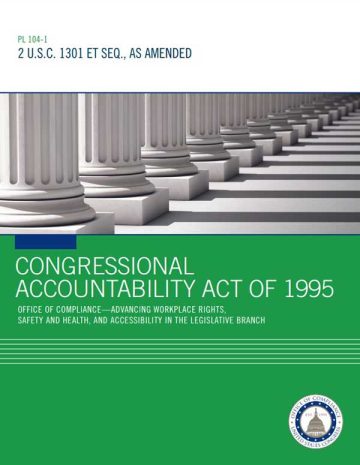INTRODUCTION TO THE CONGRESSIONAL ACCOUNTABILITY ACT
The Congressional Accountability Act (CAA), enacted in 1995, was one of the first pieces of legislation passed by the 104th Congress. The Act requires Congress and legislative branch entities to follow many of the same employment and workplace safety laws applied to private business and the rest of the Federal Government. The CAA also established a dispute resolution procedure for legislative branch entities that emphasizes counseling and mediation for the early resolution of disputes.
The thirteen civil rights, labor, and workplace safety laws applied by the CAA include the Occupational Safety and Health Act of 1970; the Federal Labor Relations Act; Title VII of the Civil Rights Act of 1964; the Americans with Disabilities Act; the Rehabilitation Act of 1973; the Family and Medical Leave Act; the Fair Labor Standards Act; the Age Discrimination in Employment Act; the Worker Adjustment and Retraining Act; the Employee Polygraph Protection Act; and veterans’ employment and reemployment rights under Chapter 43 of Title 38 of the U.S. Code. The Veterans Employment Opportunities Act, passed in 1998, applied the rights and protections to covered employees as defined in section 101 of the CAA. In 2010, Congress approved regulations that implemented the VEOA. Passed in 2008, the Genetic Information Nondiscrimination Act also includes covered employees and employing offices as defined in section 101 of the CAA.
The CAA protects over 30,000 employees of the legislative branch, including employees of the House of Representatives and the Senate (both Washington, D.C. and state district office staff); the Office of the Architect of the Capitol; the U.S. Capitol Police; the Office of Congressional Accessibility Services; the Congressional Budget Office; the Office of the Attending Physician; and the Office of Compliance. Certain provisions of the CAA also apply to the Government Accountability Office (GAO, formerly the General Accounting Office) and to the Library of Congress.

